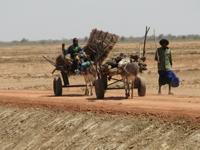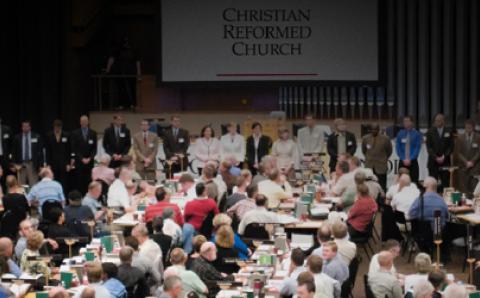Last summer The Banner reported on the CRC Office of Social Justice’s work regarding a proposed U.S.-funded irrigation project in West Africa (“Advocating for Justice Everywhere,” July 2010). My wife, Mary, initiated action concerning the project when she learned it was slated not only to bypass people who could benefit from it, but displace them from their land. As a result, the government worked out a new proposal.
Nonetheless, the project required the resettlement of our local village. Last month Mary and I experienced that resettlement firsthand, and I’m pleased to report it was much more successful than you might imagine.
You may remember that, for the past seven years, the Christian Reformed World Relief Committee (CRWRC) has been deeply involved with the U.S. Millennium Challenge Account’s endeavor to expand the amount of irrigated land here in our adopted country in West Africa.
With your prayers and pleas to Congress, we were able to bring to light corrupt individuals who were trying to hijack this project for their own benefit to the detriment of our friends and neighbors. Had those greedy persons succeeded, our neighbors would have been pushed off their land without compensation. Praise God that justice prevailed instead.
Unintended Consequences
One unintended consequence was that the village where we have lived for the past 23 years was slated for destruction. It was leveled and made into irrigated fields. As a result, all the inhabitants had to be resettled.
A core value of our ministry is that we emulate Jesus Christ, who became incarnate so that God could reach humankind. We too “move in” and live closely with our neighbors. As a result, when the village census was taken, we were included, and the number “26” was painted on our front door to identify us. Once the new village was constructed, our family would have a new home and be resettled just like everyone else. We were going to have an insider’s view of what it’s like to be subsistence farmers experiencing forced resettlement.
Moving Day
Moving day arrived on a pleasant, clear February morning after literally years of meetings, planning, and preparation. The U.S. government went to extraordinary lengths to make this resettlement as smooth as possible. The village was visited by anthropologists, agriculture experts, cattle experts, literacy teachers, and many others.
 A donkey pulls a cart full of a family’s belongings.
A donkey pulls a cart full of a family’s belongings.The young men of the village were hired to be the movers. A few days before the move, a team came through and tagged every family’s possessions with their I.D. number. We had “26” tags on everything we owned. Then a locally hired truck arrived, and the young men jumped out and started loading possessions for the one-mile trip to the new village.
Several women were hired to help with meal preparation. The planners, alert to the smallest details, were concerned that in all the upheaval the families would become separated from their grain, their cooking pots, or their firewood. To avoid this, meals were prepared at a location in the new village and delivered right to the recipients’ doors. It reminded us of Meals on Wheels!
Several rams were provided, so each meal could include fresh mutton. I don’t think our neighbors have ever experienced fresh meat twice a day for three days in a row.
The Outcome
Despite this major disruption to their lives, our neighbors were cheerful and joyful during the move. Nearly all of them had lived their entire lives in the former village. While they were sad at being forced to someplace new, they knew that they would be getting irrigated fields and that their standard of living was going to take a huge leap forward.
Through this whole process they were treated with dignity and respect. If you are a U.S. taxpayer, you funded this project. As someone personally affected by your project, I can say, “Well done!”
Many of our neighbors have expressed the same sentiment. They have stopped by to thank us for this huge blessing in their lives. The Holy Spirit is at work here. Some who previously opposed our message and ridiculed those who are interested have come to thank us. They have even asked if there is something they can do to show their gratitude for the advocacy that resulted in this.
It is difficult to explain the scope of what has happened here. For the first time our village will have a school and teachers. A clinic and warehouses have been built. Ditches have been dug along the new streets to move rainwater away. And our friends will soon have income from their fields to pay for medicine, to purchase what foodstuffs they can’t grow, and to pay school fees.
CRWRC, even in the best of financial times, would never have enough resources to bring about this level of impact in economic change in such a short time. But, thanks to your support of us, CRWRC has been present and our Lord has been active. Rejoice with us, and may we see God’s kingdom ever expanding here.








